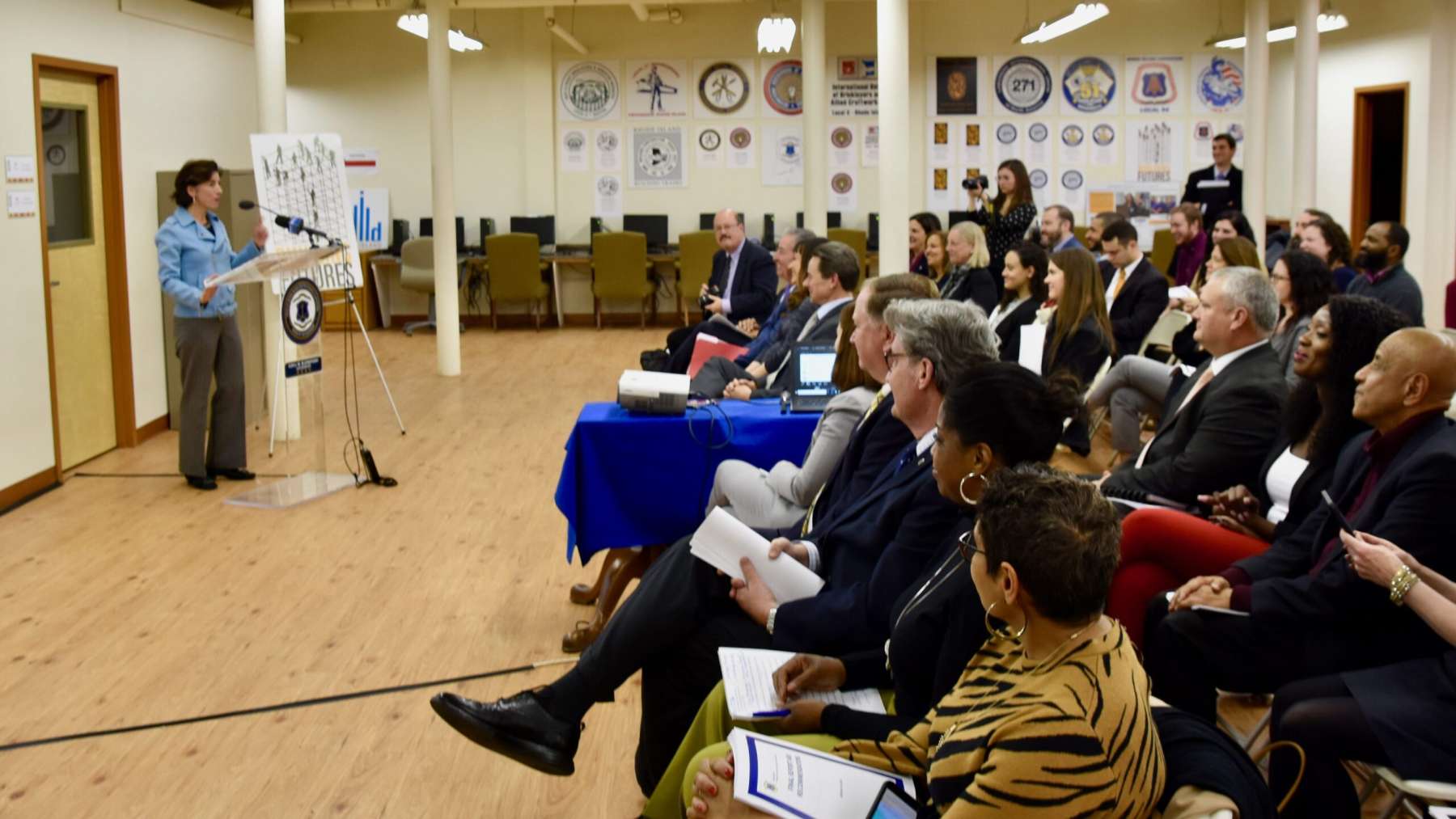Raimondo’s Juvenile and Criminal Justice Working Group releases recommendations
“At what point am I truly allowed to be rehabilitated?” asked Roxxanne Newman, a formerly incarcerated member of the Working Group. Governor Gina Raimondo’s Juvenile and Criminal Justice Working Group issued its final report on Friday, including dozens of recommendations to address barriers to reentry and better support justice involved youth. Governor Raimondo signed the executive order creating the Working
January 13, 2020, 12:01 pm
By Steve Ahlquist
“At what point am I truly allowed to be rehabilitated?” asked Roxxanne Newman, a formerly incarcerated member of the Working Group.
Governor Gina Raimondo’s Juvenile and Criminal Justice Working Group issued its final report on Friday, including dozens of recommendations to address barriers to reentry and better support justice involved youth.
Governor Raimondo signed the executive order creating the Working Group in August 2019. The Working Group, comprised of 46 experts, advocates and government leaders, was divided into two subcommittees to narrow the focus on juvenile justice and criminal justice, respectively. Chief Judge Michael Forte chaired the juvenile justice subcommittee and Justice Maureen Keough chaired the adult criminal justice subcommittee, while Michael Grey, chair of the Governor’s Workforce Board, served as co-chair of both.
“It’s critical that we prioritize breaking down barriers to reentry and supporting justice involved youth as we reform our criminal justice system,” said Governor Raimondo. “Our goal is rehabilitation, not punishment, and we still have work to do to ensure a more fair, equitable system. I’m grateful to the members of the Working Group for their hard work in developing these recommendations.”
Roxxanne Newman was part of the working group. “My role here was to speak as a previously incarcerated person with lived experience. I’m also a person in long term recovery,” said Newman. “I think people in the group are recognizing that those who are in the criminal justice system are already substantially disadvantaged as a result of race [and] class. Those who have substance use disorders normally have gone through significant trauma.”
Transitioning from the criminal justice system back into regular life can be made difficult by systemic barriers. “The transition… takes time,” said Newman. “It takes a lot of resources and help. That’s partly what the group was about, was learning how we can initiate and reaffirm and build upon resources to make that transition easier.
“I started in the criminal justice system when I was 13,” continued Newman. “And this essentially spilled over into my adult life as a result of my drug addiction. When I was about 27 years old, I started my recovery process and after a little bit of time I had found my way out of the criminal justice system. My life’s drastically changed. But you know, even though my life’s changed a lot, I still have substantial barriers because now I have a criminal record. That affects my educational attainments, my professional attainments, any type of employment – I mean, things that you just would never imagine until they ask – licensing burdens…
“At what point am I truly allowed to be rehabilitated?”
Watch my full interview with Roxxanne Newman here:
The Working Group’s recommendations include:
- A more robust discharge planning unit for the Rhode Island Department of Corrections, with a focus on ensuring government benefits are in place before an individual is discharged from the facility as well as ensuring the other housing, employment and education recommendations are implemented.
- Increased healthcare services access and making sure that currently and formerly incarcerated individuals have proper access to medical and behavioral health services as they transition out.
- Implement strategies to incentivize the Work Release Program at the Minimum Security facility.
- Parole-related reform, including reforms that will allow for low-level violators to remain in the community following technical parole violations. Additionally, exploring ways that our state can join other states in offering some form of geriatric parole as another way to assist with our aging population at the DOC.
- Establish an outcomes-based supported housing program pilot.
- Develop a feasibility assessment and implementation pathway for rehabilitative housing model.
- Enact discrimination protections that will benefit people leaving the Adult Correctional Institutions (ACI) and eliminate legal restrictions to housing options where possible.
- Create stronger housing placement infrastructure at the DOC.
- Make new investments in housing options for the justice-involved. Employment & Education Recommendations
- Enact or amend a data sharing agreement between DOC and Rhode Island Department of Labor and Training (DLT) so that the state can track outcomes of education and employment programs conducted inside the ACI.
- Ensure that all programing offered at the DOC is high quality and aligned to industry demand.
- Access to technology should be embedded in training programs.
- Provide additional capacity and dedicated funding to create pre-apprenticeship and apprenticeship pathways inside the ACI.
- Drive equity-focused licensing reform through state agencies when possible.
- Expand the Juvenile Hearing Board (JHB) and Rhode Island Department of Children Youth and Families (DCYF) pilot programs if it proves to be a successful model in Providence and Central Falls. These pilots may also help address the racial and ethnic disparities that exist in the juvenile justice system.
- Increasing the ways that referrals are made to JHBs by allowing school districts, families, or the Family Court to refer.
- Utilize the Risk Assessment Instrument, passed into law by the General Assembly in 2008, for detention decisions to make them more equitable.
- Propose statutory language to require schools complete problem-solving preliminary steps, like connecting families and resources to school supports, before filing a petition.
- Provide robust in-school counseling and health services and develop stronger connections between schools and local service providers.
- Drive work to shift the way educators understand truancy and how truancy petitions can negatively impact youth.
- Utilize early truancy prevention measures in early childhood and elementary education.
- Employ restorative justice practices.
- Establish crisis behavioral health services for youth.
- Review rates for critical behavioral health services.
- Incentivize the uptake of trauma-informed care.
- Eliminate administrative barriers for accessing insurance.
- Require transition planning meetings to happen earlier and for transition calls with schools to happen several weeks before a youth is released.
- Expand who is eligible for the Reentry Court.
- Create a pilot PrepareRI internship program for youth at the Training School.
- Create a “check list” of best practices to support the reentry process and ensure that transition counselors are implementing best practices.
Many of these recommendations will be turned into legislation and make their way through the General Assembly, possibly to be passed.
A copy of the full report can be found here.
UpriseRI is entirely supported by donations and advertising. Every little bit helps:
Become a Patron!








